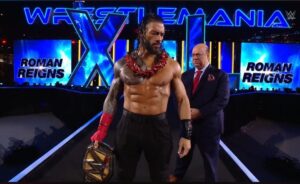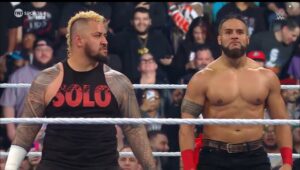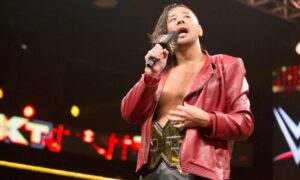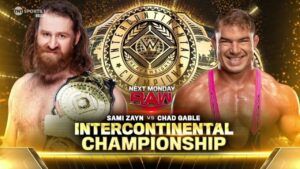There’s no denying that in the past few years, the United Kingdom’s wrestling scene has emerged from being just a phenomenon on the British Isles and has transcended international stardom. Such UK stars as Zack Sabre Jr., Will Ospreay, “The Villain” Marty Scurll, and the WWE UK Champion “Bruiserweight” Pete Dunne are fast becoming well known names to wrestling fans around the world. Promotions like England’s PROGRESS and Revolution Pro UK (RevPro), Scotland’s Insane Championship Wrestling (ICW) and Ireland’s Over The Top (OTT) Wrestling (not UK, but in the British Isles) have seen record numbers for live attendance and international views on their respective online streaming services. After being somewhat dormant (or at least unnoticed by those beyond the English Channel) for decades, the UK wrestling scene has returned fast and furious, and are producing some of the world’s most exciting talents.
(DISCLAIMER: The following historical overview is not fully comprehensive and due to space, cannot list every wrestler or promotion that has helped UK wrestling along the way from the early 1900s until 2018. We have striven to tell the best story possible, but there are hundreds if not thousands of more stories that can be told to enhance this. We encourage any readers who have interest in this to search out some of these promotions and further historical accounts to fully embrace the entire history of the United Kingdom & Ireland wrestling histories).
A Brief History of UK Wrestling: The Origins

Pro wrestling took its time getting to the United Kingdom (at least in comparison to the 1800’s carnival days in the United States), but it’s rise began when an American named Jack Carkeek headed over to England to wrestle in his parent’s homeland at the turn of the 20th century. Carkeek travelled England with a shoot wrestling challenge to take on anyone brave enough last 10 minutes in the ring with him and after beating all-comers, he was finally answered by a Russian grappler who happened to be looking to make his name for himself in wrestling in Europe – “The Russian Lion” George Hackenschmidt. When Carkeek discovered who his challenger was, he quickly changed the provision to “Englishmen only”, but promoter Charles B. Cochran saw money in promoting the Russian phenom. In 1902, England’s top wrestler, Tom Cannon, was defeated by Hackenschmidt in Liverpool, winning the European Greco-Roman Championship (he would unify it with the American Heavyweight Championship in 1905 by defeating Tom Jenkins, becoming the first true World Heavyweight Champion). Wrestling was now becoming a viable attraction to the many classes of Britain, but it still relied heavily on foreign stars like Stanislaus Zbyszko, The Terrible Turk and Hackenschmidt himself. The love affair with these foreigns stars began to wane, and by the mid 1910’s, amateur wrestling had overtaken the pro ranks as the preferred form of entertainment.
As professional wrestling in the United States began to adapt and change it’s presentation in the 1920’s (thanks to the work of three promoters, World Heavyweight Champion Ed “Strangler” Lewis, Billy Sandow and Toots Mondt, also known as The Gold Dust Trio), word of this new style, which including incorporating multiple styles of wrestling, reached the British Islands and inspired British grapplers and promoters to follow suit. The most influential one of the bunch was Atholl Oakeley, an amateur grappler who, along with fellow wrestler Henry Irslinger, created Britain’s first major wrestling promotion, the British Wrestling Association (BWA) in late 1930. Their use of multiple forms of wrestling styles, from Greco-Roman to catch, resulted in what they referred to as “All In” Wrestling. That same year, Oakeley became the very first ever British Heavyweight Champion. In the early stages of the BWA, business was booming – some cards drew in 14,000 people in London. But once again, interest waned and the UK scene attempted new ideas, including some of the earliest recorded uses of weapons (such as chairs), plus adding women’s matches. Sadly they failed, and by the Second World War, wrestling had faded back to pub entertainment.
A Brief History of UK Wrestling: The Second Wave

Much like the BWA took some inspiration from the Gold Dust Trio in the 1930s, the UK scene again drew inspiration from their American cousins following the Second World War. With the formation of the National Wrestling Alliance (NWA) in 1948, promoters saw a unified alliance of regions – or territories – unite under one banner and saw pro wrestling in the US begin to flourish, especially with the advent of television. Wrestling matches became prime content for these new channels and wrestlers were becoming household names in the US because of it. In 1952, UK promoters Billy Dale, Jack Dale, Johnny Dale, and Les Martin banded together to form Joint Promotions, that also took in promoters Norman Morell and Ted Beresford from the Yorkshire area, Billy Best in Liverpool, Arthur Wright in Manchester and George de Relywyskow in Scotland. Together they ruled the British wrestling scene. With the introduction of television into the UK, by 1955 Joint Promotions had a show on ATV and it proved to be a financial success for the wrestling alliance. In 1964, Joint’s wrestling became part of the wrestling segments for ITV’s World of Sports show (ATV and ABC became ITV) and over the next decade, became the arguably the most watched segments of the show.
Stars such as Big Daddy, Giant Haystacks, Billy Robinson, Mick McManus, Johnny Kidd, Dave ‘Fit’ Finlay, Jackie Pallo, Johnny Saint and more became household stars in the UK – Big Daddy’s popularity in Britain in the 1970s rivalled Hulkamania of the 1980s. By by the early 1980s, wrestling’s popularity in the UK once again began to dwindle. Joint Promotions’ over dependence on some aging stars was taking its toll at the gates. In 1984, Brian Dixon, who had run one of Joint’s rivals, Wrestling Enterprises of Birkenhead, rebranded the company as All Star Wrestling (ASW) and began to utilize younger stars and create new angles – they even signed away Joint’s World Heavyweight Champion John Quinn during his reign, who brought the title over to ASW. But an interview in The Sun from pro wrestler Tony Walsh unveiled the predetermined aspects of the sport, destroying decades of kayfabe, which caused further dissent from the public. In 1986, World of Sports was cancelled. The BBC tried to keep the wrestling show going, but with inconsistent times slots and the addition of a new American broadcast from the World Wrestling Federation (WWF), Joint Promotions finally got axed from ITV in 1988. One UK promoter stated that “what chance did an ageing Joint roster stand when young viewers had seen Hulk Hogan and Randy Savage in a wild lumberjack match before 20,000 Madison Square Garden fans.”
A Brief History of UK Wrestling: The 1990s

By 1992, not only was the territories of the NWA collapsed in the United States, but it’s UK-cousin, Joint Promotions, had finally closed its doors. With wrestling on British TV now WWF dominated (and later WCW), British promotions were forced to rely more on their live events than the security of television contracts. Merseyside’s ASW continued to thrive, and UK grappler Ricky Knight, alongside his wife Saraya Knight and tag team partner Jimmy Ocean formed World Association of Wrestling (WAW) in Norfolk in 1993, while Mark Sloan started up Fratton Wrestling Alliance (later renamed Frontier Wrestling Alliance, FWA). That same year, another UK grappler, Andre Baker, opened up the UK’s first NWA territory, NWA UK Hammerlock, in the Kent, England area. Hammerlock became an integral part of the current wrestling boon, as their schools were instrumental in the careers of such current stars like Finn Bálor, Zack Sabre Jr. and Becky Lynch. While UK wrestling struggled to gain any traction on television throughout the 1990s, the smaller promotions secured their regional strongholds and created schooling systems that defined the grapplers of today.
A Brief History of UK Wrestling: The 2000s

As the promotions made it through the 1990s on live events beneath the shadow of the wars between the WWF and WCW, the 2000s saw some big changes on the UK scene. The creation of International Pro Wrestling United Kingdom (IPW:UK) in 2004 signalled the creation of Britain’s first true super indie promotion, around the same time that promotions like Pro Wrestling Guerrilla (PWG), Ring of Honor (ROH), CHIKARA and TNA Impact Wrestling were starting up in the United States. They held their first card on September 25, 2004, and featured US indie wrestlers like Colt Cabana and Super Dragon, as well as UK wrestlers like Rockstar Spud, Robbie Brookside and Jonny Storm. Other promotions began to surface as well, including Manchester’s FutureShock (2004), Newcastle’s Main Event Wrestling (MEW, 2006), London’s Lucha Britannia (2006), Hull’s New Generation Wrestling (NGW, 2008) and Wolverhampton’s Fight Club: PRO (2009). In Scotland, the Scottish Wrestling Alliance (SWA) emerged in 2002, followed by Glasgow’s ICW in 2006. On the Emerald Isle, Ireland saw its pro wrestling scene begin to flourish with Cork’s Irish Whip Wrestling (2002) in the Republic of Ireland and Belfast’s Pro Wrestling Ulster (PWU, 2007) in Northern Ireland. With new promotions popping up all the time, the hunger for live pro wrestling featuring homegrown stars began to rise, just as WWE’s television product began to decline in popularity following the demise of WCW and ECW. By the end of the 2000s, the UK wrestling scene – wrestlers and fans alike – were chomping at the bit for a return to the glory days of World of Sport.
https://www.youtube.com/watch?v=YITAaB2IKSU
A Brief History of UK Wrestling: The New Breed

As the 2010’s began, the UK independent scene began to really take a foothold in the collective conscience of the wrestling fans in the British Isles. The new promotions of the 2000s were growing in stature, and in 2010, two other promotions emerged that would help carry the torch. In Cambridgeshire, Southside Wrestling Entertainment (SWE) entered the fray, while in London, Pro Wrestling: EVE was established as the UK’s premier all-female promotion, following in the footsteps of the successful SHIMMER in the US and WAW’s Bellatrix promotion. In 2011, young UK grappler Pete Dunne (soon to be joined by his friend Mark Andrews) opened ATTACK! Pro Wrestling in Wales, while Steven Fludder opened up Preston City Wrestling (PCW) in Lancashire. In the summer of 2012, Cork in the Republic of Ireland saw the emergence of another new promotion, Celtic Championship Wrestling (CCW). The year 2012 would prove to be much more than the bolstering of Ireland’s wrestling scene. It would be a pivotal year in the dramatic shift of how British wrestling would shift from a live event spectacle into the world’s next great scene.

In late 2011, comedian Jim Smallman and his agent, Jon Briley, where disenfranchised with the wrestling world. Smallman was a fan of the Japanese strong style and wanted to see a more impassioned style of pro wrestling on UK soil. Together (later adding actor Glen Joseph to the ownership trio) they created PROGRESS Wrestling in London. On March 25, 2012, PROGRESS held its first event, Chapter 1: In The Beginning, that saw Nathan Cruz win the inaugural PROGRESS Championship, and featured such future superstars like Zack Sabre Jr., Marty Scurll, Noam Dar, and Zack Gibson. The event drew over 300 audience members and as the shows continued, so did the attendance numbers continue to rise. By Chapter 12 in 2014, they were drawing 700 people, and in 2016, hit 2400 fans at the Brixton Academy. Attacking online streaming in 2015, PROGRESS’ content became available worldwide, and with the amount of talent they had at their disposal, it didn’t take long for PROGRESS to become an internationally acclaimed promotion, showcasing the UK’s finest to wrestling fans around the world. They toured Canada in 2016, followed by Germany and US tours in 2017, an Australian tour and expanded US tour in 2018, heading towards their biggest endeavour yet, Hello Wembley!, at the SSE Arena in Wembley Stadium this September, with a capacity over 10,000 people.

In 2012, Scotland’s ICW also began its own shift into one of the UK’s top promotions, after a few stutter starts since its inception in 2006. What began as a regional Glasgow promotion was now touring Scotland as well as south of the border, running shows in English cities like Liverpool, London, Newcastle, Leeds and more. They too launched their own on-demand streaming service in 2015, bringing ICW to the rest of the world.

In August of 2012, Andy Quidlan left his position with IPW:UK and formed his own company, RevPro, in Kent. RevPro held their first event on August 26 that year, Summer Sizzler, that featured the likes of Fergal Devitt (Finn Bálor), Zack Sabre Jr., Marty Scurll, Dave Mastiff and an emerging US indie star named Johnny Gargano. In 2015, RevPro entered into the IWGP Conception, an international alliance lead by NJPW, that also included ROH in the US and CMLL in Mexico. This has lead RevPro to holding joint events with both ROH and NJPW in the UK. RevPro also joined the online streaming service with their own On Demand site in 2016.
https://www.youtube.com/watch?v=0rLp3WQPwZ4

In October of 2014, Irish wrestler Luther Ward opened up his own promotion, OTT, in his hometown of Dublin in the Republic of Ireland, starting with their first event, Fuck PG – The Debut Event. The card featured such talent as Pete Dunne, Ryan Smile, WWE UK tournament hopeful Tucker, and a pre-Session Moth Martina (then Kazza G), amongst an array of some of Ireland’s top indie talents. Today, OTT has emerged as Ireland’s top indie promotion and has also recently entered the IWGP Conception, with NJPW stars starting to grace OTT cards of late. In 2017, OTT finally launched their own On Demand Service.

In June of 2016, UK pop culture site WhatCulture – which had created a rabid fan base due to its wrestling department – launched their own wrestling promotion, WhatCulture Pro Wrestling (WCPW). From day one, their shows were available for free on YouTube, and enticing some of the UK’s biggest stars, like Will Ospreay, Zack Sabre Jr., Joe Hendry and others, as well as international stars like Kurt Angle, Rey Mysterio, Cody Rhodes and The Young Bucks, created a massive online presence internationally. In December of last year, they rebranded as Defiant Wrestling, and have since created their own pay-per-view/on demand service for their larger special events.

In the summer of 2017, promoter Billy Wood bought IPW:UK and looked to elevate IPW back into the ranks of the UK’s elite promotions. The results have been exciting, as IPW invaded Defiant late in the year, and continues to put on some great shows, carrying on its rich tradition of wrestling history in England. They can also be found On Demand online with a revamped site.

As 2018 hits approaches its halfway point, global interest in UK wrestling has never been higher. It’s superstars are appearing in the WWE, Impact Wrestling, NJPW, Ring of Honor and beyond, to the top indies in the US, Canada, and Europe. NJPW holds Global Wars with RevPro in the UK (as well as bringing a Strong Style Evolved UK event), ROH is bringing Honor United to Britain, and WWE is bringing another WWE UK Championship Tournament to London in June. But all of that wouldn’t even have been an option if not for the tireless hard work of the indies that fought through the collapse of World of Sport, persevere through the television-less 1990s, and encourage the rise of new UK promotions in the past 15 years to carry on the rich tradition of British wrestling for the rest of the world to see.

Are you a wrestling fan from the United Kingdom or Ireland? Let us know your favourite stories of the wrestling scene in the UK, from any era, in the comments below!






